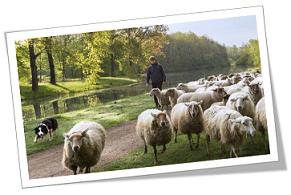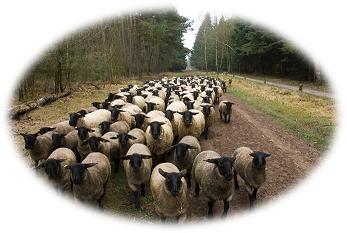Where Are the Shepherds?
Where Are the Shepherds?
In the church we have received shepherds who are continually busy with the care of the flock. The flock is not their own, but in reality belongs to the great Good Shepherd. To be a shepherd for His flock, one must have a close relationship with the Shepherd. In the shepherd the church must see something of the Good Shepherd. Members of the Lord’s church have been wondering: where are the shepherds? Are they around, and are they in their rightful place?
Who are the shepherds?⤒🔗
It is clear from God’s Word that the ascended Christ cares deeply for His church. He does so also through people, who must carry out the work on His behalf. He has given shepherds and teachers to the church, as Paul writes in one of his letters. The question has arisen: to whom was the apostle referring? It is certain that he meant the present-day shepherds and teachers. Throughout the centuries, these servants of the Word have fulfilled an important task within the church. But are they still around? 
We hear of many who prefer other lines of work. In the big cities we have seen a drastic reduction of preachers, particularly in the larger churches around us. If the shepherds and teachers disappear, what will become of the sheep? Must they do without the care of a shepherd just at the time that they require extra attention? In days past, a practical-minded professor commented that the church breaks down through a shortage of pastors!
Still, when it comes to shepherds, we should not only think about the ministers. In fact, it is first of all the elders who are ordained as shepherds over the flock of the Lord. It can happen that a number of congregations have trouble finding elders willing to serve. Isn’t it then that the shepherd’s care for the flock is lacking?
Where are they?←⤒🔗
Just like ministers, elders are very busy people, at least if they understand the depth of their call. At the other extreme, it is possible that they are so lazy as to be unworthy to stand in the Lord’s service. The Good Shepherd would do anything for his flock! Much is expected of office bearers, and some people even suggest that they should be doing more. They must take courses, train themselves for the task, attend all manner of conferences, and read a lot. In this way they can be busy constantly. What could be wrong with further equipping themselves for their work? An office bearer who does not want to learn and thinks he knows it all can come across as “pleasant” to the congregation, but is he a true shepherd to the entire flock?
The potential danger is that the office bearers give much time and care to many important things in the congregation, but are then unprepared for the actual work: to show concern for the flock and to be compassionately busy with the sheep who need their loving presence. Then the members may well ask: where are the shepherds? If it becomes apparent that the shepherds are everywhere but with the flock, then the sheep are not only neglected but also prone to injury and death.
Even if a minister preaches well, is he also being a shepherd? Even if an elder has an understanding of many things, do the sheep receive his care? Shepherds belong with the flock. If there were no shepherds…
Being a shepherd←⤒🔗
Already in the Scriptures, the danger is pointed out – more than once and fairly directly – of people who bear the name “shepherd” but are not shepherds. They are more like babysitters for the sheep, just as there used to be hirelings for the flock. (Today we use other titles, for not all who are managers are shepherds.) All who are expected to care for the church will have to be economical with their time, using a schedule or program. The work must have order so that the obligatory things are accomplished. But even if you have all your ducks in a row and everything under control, even to the instruction of other elders, you may be an efficient manager in the church but not necessarily a shepherd. Every era has had its dangers for the flock. Today one of these hazards is “management.” With this comes prerequisite skills and abilities, such as the possession of excellent conversation techniques, but does this make you a good shepherd? Some office bearers must indeed learn to become more organized in their work, or the whole flock suffers. But we endanger the flock even more when we are not true shepherds.
Being a shepherd means having a heart for the flock, being there for the flock. It means to take care of the flock in such a way that each sheep receives spiritual food – figuring out what each individual sheep stands in need of. It means to go to work without partiality. It means interaction with the flock in order to listen to what each sheep must receive to really live. Just your presence is not enough. You can score so many visits and yet give no thought to the individual needs of the sheep. You can run from one visit to the next – and the members are left with no chance to express themselves, rendering your visit useless. It is so easy to speak without truly listening to the issues at hand. 
Shepherd care expresses itself in its understanding of the flock. It is giving of the right food and leading the sheep towards the Good Shepherd, so that they come to know Him better. You can only provide spiritual leadership when you yourself live near Christ, when you give and receive His Shepherd’s care.
Shepherds provide the flock with food and drink, but they are also responsible for protecting them. They don’t allow the sheep to be devoured by ferocious beasts who come to attack them. They keep danger at a distance, even when it means risking their own lives for the sheep. A true shepherd does not abandon the sheep in times of trouble, but fights for them. The sheep will not be shaken by unscriptural teachings. They will be kept away from an unchristian lifestyle. Even when they are being difficult, don’t give them over to the evil that threatens. You are the shepherd!
Jesus says: no one shall snatch one of My sheep out of My hand. In this image He includes His Father as well. So a shepherd in the congregation is the image of Jesus and of His Father. The word Shepherd is, in fact, used throughout Scripture as a name for the Father.
The Good Shepherd←⤒🔗
The Good Shepherd has provided care for His sheep like none other. When the band of soldiers came to arrest Him in the garden of Gethsemane, He told them: if you seek Me, the Shepherd, then let these men, the sheep, go free. He laid down His life for His sheep. He faced death for them, out of an unimaginable love for these sheep.
It is love that drives the shepherd. The closer the shepherd’s relationship is with the Good Shepherd and His great love for sinners, the more this shepherd will bear His image. This is how the congregation comes to realize that the office bearer represents the Good Shepherd. The sheep know his voice and follow him. When office bearers have much of Him in their lives, not only do they know His sheep, but the sheep also know them and follow them. They have become convinced that the Good Shepherd Himself is taking care of them through the care of the shepherd.
More than ever, we need such shepherds in our congregations. Time and again it becomes evident that both old and young are crying out for the care of a shepherd. In the office bearer they want to see something of the Good Shepherd Himself. And rightfully so! For every shepherd and teacher must bear the image of Him who gave His life for His sheep.

Add new comment